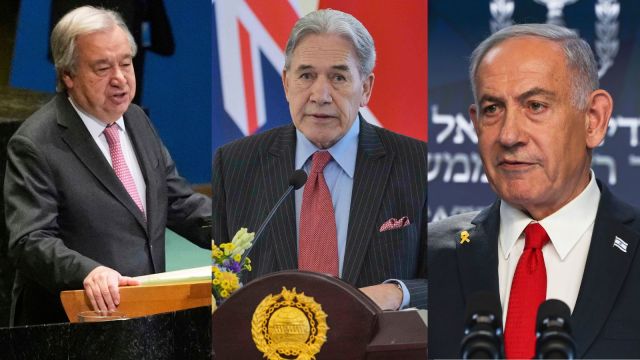Stay updated with the latest - Click here to follow us on Instagram
How world leaders have reacted to US strikes on Iran’s nuclear sites
US President Donald Trump confirmed the military airstrikes, saying, "Our objective was the destruction of Iran’s nuclear enrichment capacity..."
 Israeli Prime Minister Benjamin Netanyahu praised the US strikes, calling them “in full coordination with Israel.” (In photos: UN Secretary General Antonio Guterres/ AP, New Zealand's Foreign Minister Winston Peters/ AP, Israeli Prime Minister Benjamin Netanyahu/ Pool via AP)
Israeli Prime Minister Benjamin Netanyahu praised the US strikes, calling them “in full coordination with Israel.” (In photos: UN Secretary General Antonio Guterres/ AP, New Zealand's Foreign Minister Winston Peters/ AP, Israeli Prime Minister Benjamin Netanyahu/ Pool via AP)The United States Saturday hit three Iranian nuclear facilities, triggering a host of responses from world leaders: from full-throated praise by Israel to strong condemnation from others, including the United Nations. In a televised address address, US President Donald Trump confirmed the military airstrikes on Iran’s Fordow, Natanz, and Isfahan nuclear sites.
The strikes were were conducted with stealth bombers and precision-guided bunker busters.
“Our objective was the destruction of Iran’s nuclear enrichment capacity and a stop to the nuclear threat posed by the world’s number one state sponsor of terror,” Trump said. He added: “Iran, the bully of the Middle East, must now make peace… If not, future attacks would be far greater and a lot easier… I want to thank and congratulate Prime Minister Bibi Netanyahu. We worked as a team like perhaps no team has ever worked before.”
Here is how world leaders have responded:
Netanyahu: Operation “in full coordination with Israel”
Israeli Prime Minister Benjamin Netanyahu hailed the US strikes, saying they were conducted “in full coordination with Israel.” In a recorded statement, Netanyahu declared:
“Congratulations, President Trump. Your bold decision to target Iran’s nuclear facilities with the awesome and righteous might of the United States will change history… History will record that President Trump acted to deny the world’s most dangerous regime the world’s most dangerous weapons.”
Iran warns of ‘everlasting consequences’
Iran’s top diplomat issued a warning, saying the attack “will have everlasting consequences” and that Tehran “reserves all options” in response. Foreign Minister Abbas Araghchi posted on X:
“The events this morning are outrageous and will have everlasting consequences.”
UN chief warns of catastrophic consequences
UN Secretary-General António Guterres voiced concern over the US strikes and the potential for further escalation. He said in a statement:
“This is a dangerous escalation in a region already on the edge – and a direct threat to international peace and security… There is no military solution. The only path forward is diplomacy. The only hope is peace.”
NATO ‘watching closely’
A NATO official told Reuters on the alliance is “watching the situation closely.” Asked about possible implications for NATO’s advisory mission in Iraq, the official reiterated the alliance’s monitoring stance.
UK urges Iran to resume talks
British Prime Minister Keir Starmer called on Iran to return to negotiations. Starmer said in a statement:
“Iran’s nuclear programme is a grave threat to international security. Iran can never be allowed to develop a nuclear weapon and the US has taken action to alleviate that threat… We call on Iran to return to the negotiating table and reach a diplomatic solution to end this crisis.”
EU urges diplomacy
European Union foreign policy chief Kaja Kallas posted on X:
“Iran must not be allowed to develop a nuclear weapon, as it would be a threat to international security. I urge all sides to step back, return to the negotiating table and prevent further escalation. EU Foreign Ministers will discuss the situation tomorrow.”
Italy hopes for de-escalation
Italian Foreign Minister Antonio Tajani expressed similar concerns in a statement to state broadcaster RAI:
“Now we hope that, after this attack, which caused massive damage to nuclear weapons production and posed a threat to the entire region, a de-escalation can begin and Iran can sit down at the negotiating table.”
China says US repeating ‘it’s Iraq mistake’
China’s state-run CGTN, in a flash commentary, questioned whether the US is repeating “its Iraq mistake in Iran,” calling the strikes a dangerous turning point. Referring to the 2003 Iraq invasion, it said:
“History has repeatedly shown that military interventions in the Middle East often produce unintended consequences, including prolonged conflicts and regional destabilisation.”
Story continues below this ad
Japan to hold a meeting
Japan’s Prime Minister Shigeru Ishiba is set to convene a meeting with top ministers to assess the implications of the US strikes on Iran’s nuclear facilities, according to NHK television.
Emergency meeting in South Korea
South Korea’s presidential office announced plans to convene an emergency meeting to assess the security and economic impact of the US strikes, as well as to consider possible responses from South Korea.
New Zealand urges diplomacy
New Zealand Foreign Minister Winston Peters said in a statement:
“We acknowledge developments in the last 24 hours, including President Trump’s announcement of US strikes on nuclear facilities in Iran. Ongoing military action in the Middle East is extremely worrying, and it is critical further escalation is avoided. New Zealand strongly supports efforts towards diplomacy. We urge all parties to return to talks. Diplomacy will deliver a more enduring resolution than further military action.”
Australia calls for de-escalation
Australian government spokesperson said in a statement:
“We have been clear that Iran’s nuclear and ballistic missile program has been a threat to international peace and security… The security situation in the region is highly volatile. We continue to call for de-escalation, dialogue and diplomacy.”
Story continues below this ad
Venezuela condemns US action
Venezuela’s Foreign Minister Yvan Gil said on Telegram:
“The Bolivarian Republic of Venezuela firmly and categorically condemns the bombing carried out by the United States military, at the request of the State of Israel, against nuclear facilities in the Islamic Republic of Iran, including the Fordow, Natanz, and Isfahan complexes.”
Mexico calls for diplomatic dialogue
The Foreign Ministry of Mexico posted on X:
“The ministry urgently calls for diplomatic dialogue for peace between the parties involved in the Middle East conflict… We reiterate our call to de-escalate tensions in the region. The restoration of peaceful coexistence among the states of the region is the highest priority.”
Cuba condemns US attack
Cuban President Miguel Díaz-Canel posted on X:
“We strongly condemn the US bombing of Iran’s nuclear facilities, which constitutes a dangerous escalation… The aggression seriously violates the UN Charter and plunges humanity into a crisis with irreversible consequences.”
Latin American nations urge restraint
Several countries across Latin America condemned the US-led military strikes and called for immediate de-escalation.
(With inputs from Reuters, AP)



- 01
- 02
- 03
- 04
- 05




























